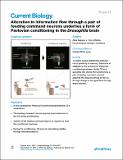Alteration in information flow through a pair of feeding command neurons underlies a form of Pavlovian conditioning in the Drosophila brain
Author(s)
Sakurai, Akira; Littleton, J Troy; Kojima, Hiroaki; Yoshihara, Motojiro
DownloadPublished version (2.506Mb)
Publisher with Creative Commons License
Publisher with Creative Commons License
Creative Commons Attribution
Terms of use
Metadata
Show full item recordAbstract
Pavlovian conditioning1 is a broadly used learning paradigm where defined stimuli are associated to induce behavioral switching. To define a causal relationship between activity change in a single neuron and behavioral switching, we took advantage of a "command neuron" that connects cellular function to behavior.2 To examine the cellular and molecular basis of Pavlovian conditioning, we previously identified a pair of feeding command neurons termed "feeding neurons" in the adult Drosophila brain3 using genetic screening4 and opto- and thermo-genetic techniques.5-7 The feeding neuron is activated by sweet signals like sucrose and induces the full complement of feeding behaviors, such as proboscis extension and food pumping. Ablation or inactivation of the pair of feeding neurons abolishes feeding behavior, suggesting that this single pair of neurons is indispensable for natural feeding behaviors.2,3 Here, we describe a novel conditioning protocol to associate a signal-mediating rod removal from legs (conditioned stimulus [CS]) to feeding behavior induced by sucrose stimulation (unconditioned stimulus [US]). Calcium imaging of the feeding neuron demonstrated it acquires responsiveness to CS during conditioning, with inactivation of the feeding neuron during conditioning suppressing plasticity. These results suggest conditioning alters signals flowing from the CS into the feeding circuit, with the feeding neuron functioning as a key integrative hub for Hebbian plasticity.
Date issued
2021Department
Massachusetts Institute of Technology. Department of BiologyJournal
Current Biology
Publisher
Elsevier BV
Citation
Sakurai, Akira, Littleton, J Troy, Kojima, Hiroaki and Yoshihara, Motojiro. 2021. "Alteration in information flow through a pair of feeding command neurons underlies a form of Pavlovian conditioning in the Drosophila brain." Current Biology, 31 (18).
Version: Final published version